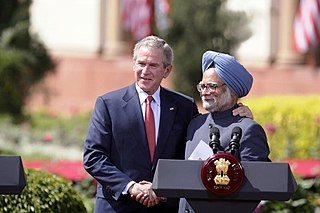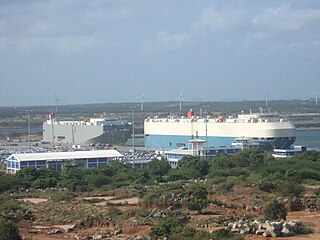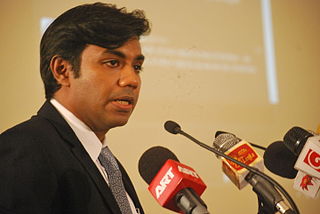
China and India have historically maintained peaceful relations for thousands of years of recorded history, but the harmony of their relationship has varied in modern times, after the Chinese Communist Party's victory in the Chinese Civil War in 1949, and especially post the Annexation of Tibet by the People's Republic of China. The two nations have sought economic cooperation with each other, while frequent border disputes and economic nationalism in both countries are major points of contention.

Krishnaswamy Subrahmanyam was an Indian international strategic affairs analyst, journalist and former civil servant. Considered a proponent of Realpolitik, Subrahmanyam was an influential voice in Indian security affairs for a long time. He was most often referred to as the doyen of India's strategic affairs community, and as the premier ideological champion of India's nuclear deterrent. His son S Jaishankar was appointed India's External Affairs Minister in 2019.

Chilamkuri Raja Mohan is an Tamil Singaporean academic, journalist and foreign policy analyst. He is the Director of the Institute of South Asian Studies, National University of Singapore. Previously, he was the founding Director of Carnegie India. He has also been a Distinguished Fellow at the Observer Research Foundation, New Delhi and Senior Fellow at the Centre for Policy Research, New Delhi, and prior to that, a professor at the S. Rajaratnam School of International Studies, Nanyang Technological University, Singapore and Professor of Centre for South, Central, Southeast Asian and Southwest Pacific Studies, School of International Studies at Jawaharlal Nehru University, New Delhi, India. He was the Henry Alfred Kissinger Scholar in the John W. Kluge Center at the Library of Congress, Washington, D.C. during 2009-10.

Thazha Varkey Paul is an Indo-Canadian political scientist. He is a James McGill professor of International Relations in the department of Political Science at McGill University. Paul specializes in International Relations, especially international security, regional security and South Asia. He served as the president of the International Studies Association (ISA) during 2016–2017, and served as the founding director of the McGill University – Université de Montreal Centre for International Peace and Security Studies (CIPSS).

The 123 Agreement signed between the United States of America and India is known as the U.S.–India Civil Nuclear Agreement or Indo-US nuclear deal. The framework for this agreement was a July 18, 2005, joint statement by then Indian Prime Minister Manmohan Singh and then U.S. President George W. Bush, under which India agreed to separate its civil and military nuclear facilities and to place all its civil nuclear facilities under International Atomic Energy Agency (IAEA) safeguards and, in exchange, the United States agreed to work toward full civil nuclear cooperation with India. This U.S.-India deal took more than three years to come to fruition as it had to go through several complex stages, including amendment of U.S. domestic law, especially the Atomic Energy Act of 1954, a civil-military nuclear Separation Plan in India, an India-IAEA safeguards (inspections) agreement and the grant of an exemption for India by the Nuclear Suppliers Group, an export-control cartel that had been formed mainly in response to India's first nuclear test in 1974. In its final shape, the deal places under permanent safeguards those nuclear facilities that India has identified as "civil" and permits broad civil nuclear cooperation, while excluding the transfer of "sensitive" equipment and technologies, including civil enrichment and reprocessing items even under IAEA safeguards. On August 18, 2008, the IAEA Board of Governors approved, and on February 2, 2009, India signed an India-specific safeguards agreement with the IAEA. After India brought this agreement into force, inspections began in a phased manner on the 35 civilian nuclear installations India has identified in its Separation Plan. The deal is seen as a watershed in U.S.-India relations and introduces a new aspect to international nonproliferation efforts. On August 1, 2008, the IAEA approved the safeguards agreement with India, after which the United States approached the Nuclear Suppliers Group (NSG) to grant a waiver to India to commence civilian nuclear trade. The 48-nation NSG granted the waiver to India on September 6, 2008, allowing it to access civilian nuclear technology and fuel from other countries. The implementation of this waiver made India the only known country with nuclear weapons which is not a party to the Non-Proliferation Treaty (NPT) but is still allowed to carry out nuclear commerce with the rest of the world.

Sergey Alexandrovich Karaganov is a Russian political scientist who heads the Council for Foreign and Defense Policy, a security analytical institution founded by Vitaly Shlykov. He is also the dean of the Faculty of World Economy and International Affairs at Moscow's Higher School of Economics. Karaganov was a close associate of Yevgeny Primakov, and has been Presidential Advisor to both Boris Yeltsin and Vladimir Putin. He is considered close to Putin and Sergey Lavrov.
The String of Pearls is a geopolitical hypothesis proposed by United States political researchers in 2004. The term refers to the network of Chinese military and commercial facilities and relationships along its sea lines of communication, which extend from the Chinese mainland to Port Sudan in the Horn of Africa. The sea lines run through several major maritime choke points such as the Strait of Mandeb, the Strait of Malacca, the Strait of Hormuz, and the Lombok Strait as well as other strategic maritime centres in Somalia and the littoral South Asian countries of Pakistan, Sri Lanka, Bangladesh, and the Maldives.
India was among the charter members of the United Nations that signed the Declaration by United Nations at Washington, D.C., on 1 January 1942 and also participated in the United Nations Conference on International Organization at San Francisco from 25 April to 26 June 1945. As a founding member of the United Nations, India strongly supports the purposes and principles of the UN and has made significant contributions in implementing the goals of the Charter, and the evolution of the UN's specialised programmes and agencies. In 1947, the United Nations Information Centre (UNIC) in New Delhi became the first United Nations office in independent India.

The Hambantota International Port is a deep water port in Hambantota, Sri Lanka, notable for its 99-year lease to China Merchant Ports. Opened in 2010, it is Sri Lanka's second largest port, after Colombo. In 2020, the port handled 1.8 million tonnes of cargo.

China–Sri Lanka relations are the bilateral relations between the People's Republic of China and Democratic Socialist Republic of Sri Lanka. There is a Chinese embassy located in Colombo and a Sri Lankan embassy situated in Beijing. Historical and cultural ties between the two countries extend back hundreds of years.

Asanga Abeyagoonasekera is a Sri Lankan academic, geopolitics and foreign policy analyst. He is a political columnist and author. He is a visiting professor for geopolitics and global leadership at Northern Kentucky University and a visiting lecturer in International Political Economy for The University of London in Sri Lanka Royal Institute of Colombo and teaches at the International Security at University of Colombo. Abeyagoonasekera has more than a decade of experience in government administration, serving as the head of several government institutions and positions at the board level. His commentaries on International Relations and Geopolitics are published by Observer Research Foundation New Delhi, London School of Economics and South Asia Journal. Abeyagoonasekera writes the monthly column Dateline Colombo for IPCS think tank in New Delhi.

Commodore Chitrapu Uday Bhaskar is a retired military officer who served in the Indian Navy. He is an expert and outspoken critics on security and strategic affairs.

Diplomatic relations between the People's Republic of China and the Maldives were established in 1972. China has an embassy in Malé which opened in November 2011, and the Maldives has an embassy in Beijing which opened in 2009. Approximately 70 percent of the Maldives' total debt is attributed to Chinese projects, with an annual payment of US$92 million to China, constituting around 10 percent of the country's entire budget. China has become pervasive in the Maldives, exerting influence over infrastructure, trade, and energy sectors, raising concerns of a new form of Chinese entrapment.

The Belt and Road Initiative, known in China as the One Belt One Road and sometimes referred to as the New Silk Road, is a global infrastructure development strategy adopted by the Chinese government in 2013 to invest in more than 150 countries and international organizations. The BRI is composed of six urban development land corridors linked by road, rail, energy, and digital infrastructure and the Maritime Silk Road linked by the development of ports.
Dashdorj Bayarkhuu is a Mongolian research professor, columnist and writer and former ambassador of Mongolia to Egypt. Prior to his nomination to the ambassadorial position, Bayarkhuu worked in media, defense, diplomatic and educational sectors. After his tenure as ambassador in Cairo, Bayarkhuu returned to academic field as a Visiting Professor of International Politics and Contracted Researcher. He joined the Ministry of Foreign Affairs of Mongolia as Deputy Director, Policy Planning & Co-ordination Department in 2015–2016.
Debt-trap diplomacy is a term to describe an international financial relationship where a creditor country or institution extends debt to a borrowing nation partially, or solely, to increase the lender's political leverage. The creditor country is said to extend excessive credit to a debtor country with the intention of extracting economic or political concessions when the debtor country becomes unable to meet its repayment obligations. The conditions of the loans are often not publicized. The borrowed money commonly pays for contractors and materials sourced from the creditor country.

Tibet–India relations are said to have begun during the spread of Buddhism to Tibet from India during the 6th century AD. In 1959, the Dalai Lama fled to India after the failed 1959 Tibetan uprising. Since then, Tibetans-in-exile have been given asylum in India, with the Indian government accommodating them into 45 residential settlements across 10 states in the country, creating the Tibetan diaspora. From around 150,000 Tibetan refugees in 2011, the number fell to 85,000 in 2018, according to government data. Many Tibetans are now leaving India to go back to Tibet and other countries such as United States or Germany. The Government of India, soon after India's independence in 1947, treated Tibet as a de facto independent country. However, more recently India's policy on Tibet has been mindful of Chinese sensibilities, and has recognized Tibet as a part of China.

China's salami slicing is a geopolitical strategy involving a series of small steps allegedly taken by the government of China that would become a larger gain which would have been difficult or unlawful to perform all at once. When discussing this concept, notedly debated in the publications of the Lowy Institute from Australia, some defenders of the concept are Brahma Chellaney, Jasjit Singh, Bipin Rawat or the Observer Research Foundation from India or the United States Institute of Peace, Bonnie S. Glaser or Erik Voeten from the US, while detractors are H. S. Panag from India or Linda Jakobson. Advocates of the term have cited examples such as the territorial disputes in the South China Sea and along the Sino-Indian border.

Abishur Prakash is a Canadian businessman, author, and geopolitical expert. He is the chief executive officer and founder of The Geopolitical Business, an advisory firm based in Toronto, Canada. Prior to this, he worked as a futurist at Center for Innovating the Future, a foresight agency.

Chinese imperialism refers to the expansion of China's political, economic, and cultural influence beyond the boundaries of the People's Republic of China. Depending on the commentator, it has also been used to refer to its artificial islands in the South China Sea and the persecution of Uyghurs in China. Although there has not been a long-standing imperial regime in China since the 1911 Revolution and the country is officially a People's Republic, some refer to China as an imperialist country. This includes socialist parties in the Pacific such as the New People's Army, the Japanese Communist Party, some Maoist parties, and the New Left. China's relations with Africa have also been accused of being "neo-colonialism".
















